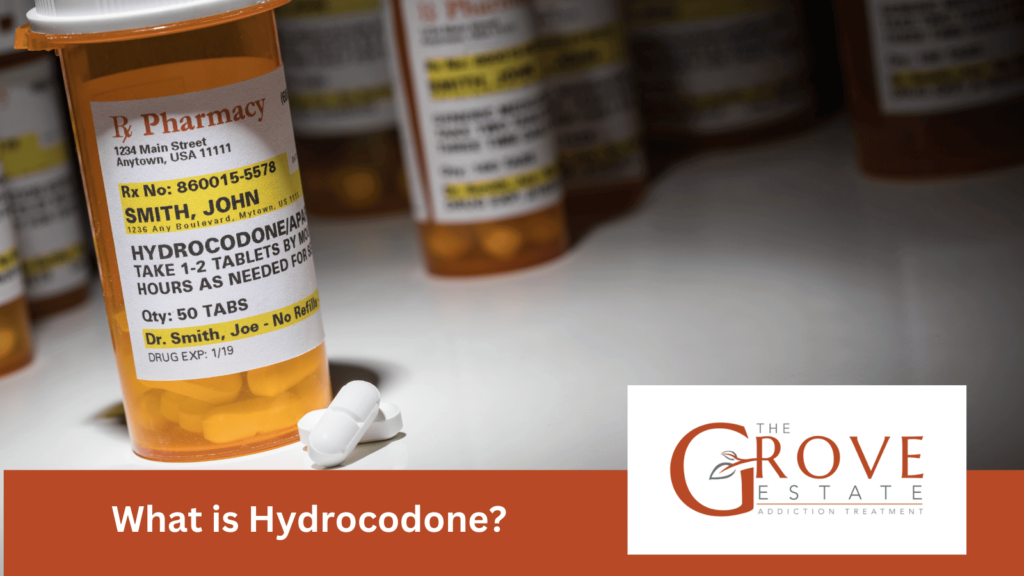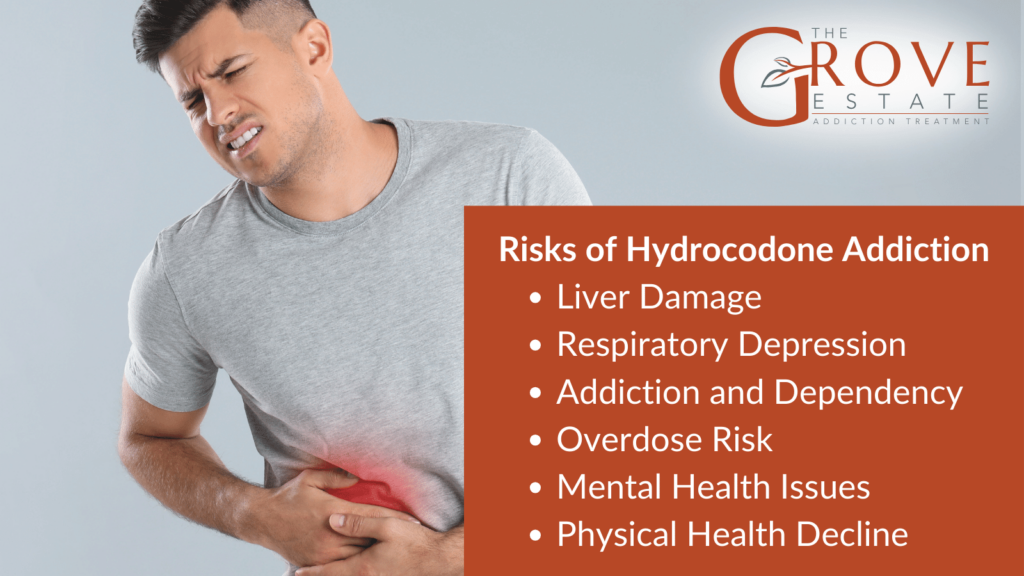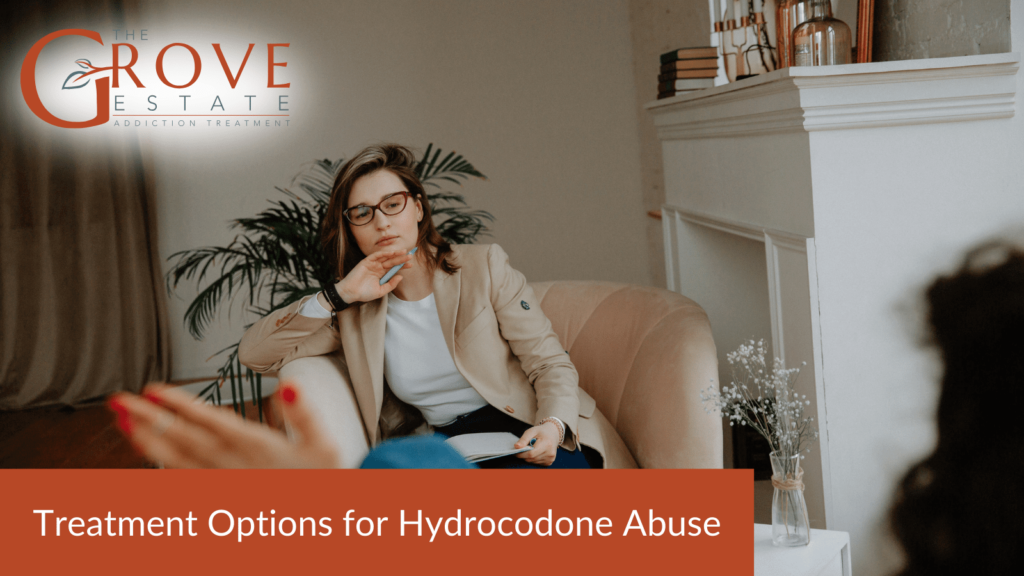Hydrocodone, a powerful opioid painkiller, is one of the most frequently prescribed medications in the United States. Despite its effectiveness in managing pain, hydrocodone has a high potential for addiction and abuse. According to the National Institute on Drug Abuse, opioids like hydrocodone were involved in nearly 70% of the over 70,000 drug overdose deaths in 2019. This shows the urgent need for awareness and education on the risks associated with hydrocodone use.
The risks of hydrocodone abuse leads to addiction, respiratory depression, and liver damage. Its psychological impacts include mood swings and depression, complicating recovery and increasing the risk of overdose, especially when mixed with other depressants
Recovery from hydrocodone addiction involves medically supervised detox to manage withdrawal symptoms. Following detox, ongoing therapy and support groups are crucial for addressing the underlying causes of addiction and preventing relapse.

What Is Hydrocodone?
Hydrocodone is an opioid medication commonly prescribed for its potent pain-relieving properties. It is typically used to manage moderate to severe pain that other treatments have not adequately controlled. Hydrocodone works by binding to the pain receptors in the brain, altering the perception and emotional response to pain. It is often prescribed for short-term use, following surgeries or injuries, but it may also be used for chronic pain management under careful medical supervision.
Often, hydrocodone is combined with acetaminophen, a non-opioid pain reliever, to enhance its efficacy. This combination is available under various brand names, such as Vicodin, Norco, and Lortab. Acetaminophen helps to increase the pain threshold, allowing hydrocodone to work more effectively. However, while this combination can be highly effective for pain management, it also poses additional risks. The presence of acetaminophen can lead to liver damage if taken in excessive amounts or used over a long period, particularly at higher dosages or in combination with alcohol. This makes it crucial for patients to follow their healthcare provider’s instructions closely and to limit their intake of other acetaminophen-containing products.
How Does Hydrocodone Addiction Develop?
Hydrocodone addiction is a chronic and progressive condition characterized by the compulsive use of the drug despite harmful consequences. This addiction is distinct from dependency, which refers to a physical state where the body has adapted to the presence of a drug, often resulting in tolerance (needing more of the drug to achieve the same effect) and withdrawal symptoms when the drug is not taken. Addiction, on the other hand, also involves a psychological component. It affects the brain’s reward system, leading to an uncontrollable craving for the drug.
The development of hydrocodone addiction can occur through several pathways. Physically, the body’s adaptation to hydrocodone results in dependency, which can set the stage for addiction as individuals may increase their dosage to overcome tolerance, often without medical guidance. Psychologically, hydrocodone affects neurotransmitters in the brain, such as dopamine, which enhances feelings of pleasure and well-being. Regular interference with the normal functioning of these neurotransmitters can make the brain reliant on the drug to produce these good feelings, leading to addictive behaviors.
What are the Causes of Hydrocodone Addiction?
Several factors contribute to the development of addiction to hydrocodone. Genetic predisposition plays a significant role, as those with a family history of substance abuse are at higher risk. Environmental influences, such as exposure to high-stress situations or easy access to opioids, can also trigger addictive behaviors. The method of administration impacts addiction risk too; for example, altering the drug to consume it in a non-prescribed way (such as crushing pills to snort or inject) increases its addictive potential.
Psychological factors are equally critical. Individuals suffering from anxiety, depression, or other mental health disorders may use hydrocodone to self-medicate, inadvertently increasing the risk of addiction. Additionally, prolonged use or taking hydrocodone in higher doses than prescribed can lead to physical dependence, which may eventually escalate into addiction as the user seeks to avoid withdrawal symptoms and maintain their habitual use of the medication.
What are Signs and Symptoms of Hydrocodone Addiction?
Hydrocodone addiction can manifest through a variety of signs and symptoms, which are crucial to recognize for early intervention. The indicators of addiction include behavioral changes, physical signs and psychological symptoms.
Here is a list of common indicators:
Behavioral Signs
- Increased secrecy or deceptive behavior
- Social withdrawal from friends and family
- Neglect of personal and professional responsibilities
- Continued use despite negative consequences
- Doctor shopping or seeking multiple prescriptions
Physical Symptoms
- Drowsiness or sedation
- Constricted pupils
- Nausea and vomiting
- Slowed breathing rate
- Frequent flu-like symptoms (a sign of withdrawal)
Psychological Symptoms
- Anxiety or agitation
- Irritability and mood swings
- Depression
- Compulsive craving for the drug

What are the Risks of Hydrocodone Addiction?
Long-term use of hydrocodone carries several significant health risks, including the potential for overdose and other severe complications. According to the National Institute on Drug Abuse, opioids are involved in 66.2% of all drug overdose deaths. Here is a list of the primary risks associated with hydrocodone addiction:
- Liver Damage: Particularly when hydrocodone is combined with acetaminophen, prolonged use can cause significant liver injury.
- Respiratory Depression: Hydrocodone can depress breathing, which in severe cases may be life-threatening, especially if taken in high doses or combined with other depressants.
- Addiction and Dependency: Chronic use can lead to physical dependence and addiction, compelling users to consume more of the drug to achieve the same effects.
- Overdose Risk: Opioids, including hydrocodone, have a high risk of death if abused.
- Mental Health Issues: Long-term use can exacerbate or contribute to issues like depression and anxiety.
- Physical Health Decline: Users might experience deterioration in overall physical health, including weakened immune system and malnutrition.
What are the Types of Hydrocodone?
Hydrocodone is available under several brand names, each formulated with varying amounts of hydrocodone and acetaminophen. Among the notable brands are Vicodin, Norco, Lortab, and the pure hydrocodone product, Zohydro.
Vicodin
Vicodin combines hydrocodone with 300 mg of acetaminophen, available in dosages of 5 mg, 7.5 mg, and 10 mg. According to a study published by the National Center for Drug Abuse (NCDAS) in 2011 with up to 131 million prescriptions. However, due to high addiction rates, it was reclassified from Schedule III to Schedule II in 2014, indicating a higher potential for abuse according to the Drug Enforcement Administration.
Norco
Norco is offered in dosages of 7.5 mg and 10 mg of hydrocodone paired with 325 mg of acetaminophen. Previously containing the least amount of acetaminophen among the variants, it was often chosen by those looking to reduce acetaminophen intake, though it now contains the highest percentage of acetaminophen after the FDA’s regulation changes.
Lortab
Lortab is available in similar strengths to Vicodin, recognized by its distinctively colored tablets. Both Vicodin and Lortab were affected by the FDA’s decision to limit acetaminophen content in medications to reduce the risk of liver damage, a directive implemented across all acetaminophen-containing drugs.
Zohydro
Zohydro is unique as the only hydrocodone formulation without acetaminophen, available in doses ranging from 10 mg to 50 mg. Approved by the FDA in 2013 despite the advisory board’s opposition, Zohydro is intended for severe, chronic pain in opioid-tolerant patients and is known for its higher risk of abuse compared to combination products.
Each product serves different patient needs for pain management. The choice among hydrocodone formulations often depends on individual medical requirements and potential risk factors, making physician oversight crucial in mitigating risks associated with hydrocodone use.
What Does Hydrocodone Withdrawal and Detox Look Like?
Hydrocodone withdrawal symptoms can be severe due to the drug’s high potential for dependence. Symptoms typically include muscle aches, sweating, nausea, diarrhea, and mood disturbances such as anxiety and irritability. These symptoms arise as the body adjusts to the absence of the drug after prolonged use.
The detox process is crucial for safely managing withdrawal and is typically the first step in the recovery journey. Detox should be medically supervised to mitigate withdrawal symptoms and prevent potential complications.

What are Treatment Options for Hydrocodone Addiction?
There are various effective treatment options for hydrocodone addiction, tailored to the severity of the addiction and the specific needs of the individual. These options range from inpatient and outpatient programs to medication-assisted treatment and various forms of therapy and counseling.
Inpatient Rehabilitation Programs
Inpatient rehabilitation programs provide a structured environment where individuals can focus entirely on recovery without the distractions or triggers of everyday life. These programs typically last 30 to 90 days and include round-the-clock medical supervision, detoxification, therapy, and support groups. They are particularly beneficial for those with severe addictions or co-occurring mental health disorders.
Outpatient Treatment Plans
Outpatient treatment plans offer more flexibility and are suitable for individuals with mild to moderate addiction who have strong support systems at home. These programs can vary in intensity and often require patients to attend treatment sessions several times a week, which may include individual counseling, group therapy, and educational workshops on addiction and relapse prevention.
Medication-Assisted Treatment
Medication-assisted treatment (MAT) involves the use of medications, such as buprenorphine, methadone, or naltrexone, to manage withdrawal symptoms and reduce cravings. These medications are used in combination with counseling and behavioral therapies to treat substance use disorders. MAT has been proven effective in improving patient survival, retaining people in treatment, and decreasing illicit opiate use.
Therapy and Counseling
Therapy and counseling are pivotal in addressing the psychological aspects of addiction. Cognitive-behavioral therapy (CBT), family counseling, and other therapeutic approaches help individuals understand the root causes of their addiction, develop coping strategies, improve communication skills, and mend relationships affected by substance use. These therapies can be conducted in individual or group settings and are integral to both inpatient and outpatient programs.
Each of these treatment options plays a crucial role in the recovery process, providing the tools and support needed to overcome hydrocodone addiction and lead a healthier life.
How Do You Find the Right Hydrocodone Rehab Center?
When searching for the right hydrocodone rehab center, it’s crucial to consider several key factors to ensure the best chance of recovery. Firstly, look for centers that are accredited by reputable healthcarehealth care bodies, such as the Joint Commission or the Commission on Accreditation of Rehabilitation Facilities (CARF). This ensures the facility meets high standards of care. Additionally, check if the center offers personalized treatment plans tailored to individual needs, which is essential for effective addiction treatment. Finally, aftercare support should be available to help maintain sobriety after leaving the facility. This can include ongoing therapy, support groups, and resources to prevent relapse.

How Can You Help Someone with Hydrocodone Addiction?
Supporting someone with hydrocodone addiction involves several key steps. First, encourage them to seek professional help, which may include detox, rehabilitation programs, and therapy. Professional guidance is crucial for effective treatment and recovery. Be supportive and non-judgmental throughout their journey, recognizing that recovery is a challenging process fraught with potential setbacks. Offer emotional support and understanding, and consider attending support groups designed for friends and family of those struggling with addiction. These groups can provide valuable advice and emotional coping strategies to aid in supporting your loved one.
Can hydrocodone addiction affect someone who follows their prescription?
Yes, even those who follow their prescription can develop a hydrocodone addiction. The body can develop a tolerance and dependence on the medication, potentially leading to addictive behaviors, even without the intent to misuse the drug.
Are there alternative pain management strategies to avoid hydrocodone use?
Yes, alternatives such as physical therapy, acupuncture, non-opioid pain medications, and cognitive-behavioral therapy can be effective for pain management. Discussing these options with a healthcare provider can help determine the best strategy for individual needs without relying on opioids.
What are the legal implications of possessing hydrocodone without a prescription?
Possessing hydrocodone without a prescription is illegal and can result in various penalties, including fines and imprisonment. Hydrocodone is a Schedule II controlled substance due to its high potential for abuse and dependence.
How does hydrocodone addiction impact family dynamics?
Hydrocodone addiction can significantly strain family relationships, leading to trust issues, emotional distress, and financial problems. Family therapy can be an essential part of recovery, helping to repair and strengthen relationships affected by addiction.
Can hydrocodone addiction be prevented?
Prevention of hydrocodone addiction starts with careful prescribing and patient education about the risks. Healthline suggests that monitoring usage and considering non-opioid pain management strategies are key preventive measures.
Moreover, understanding and managing prescriptions can help prevent addiction, similar to strategies used in DMT Addiction prevention.
What role does family play in the recovery from hydrocodone addiction?
Family involvement is crucial in the recovery process from hydrocodone addiction. Healthline emphasizes that family support can significantly impact the success of recovery by providing emotional support and encouraging continued treatment.
Engaging in family therapy, often available in residential rehab programs, can help address and mend the impacts of addiction on family dynamics.

Share This Post



